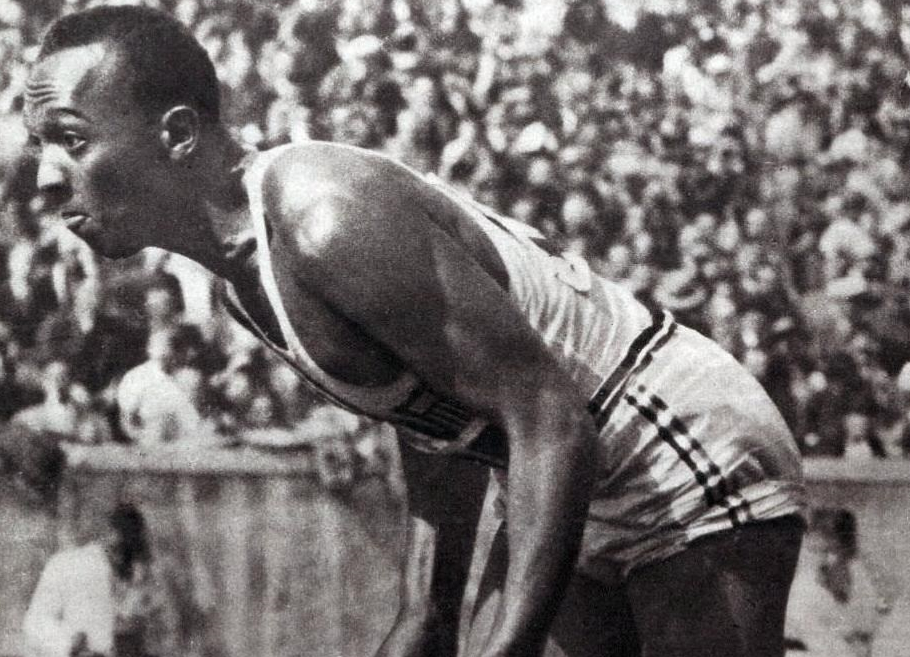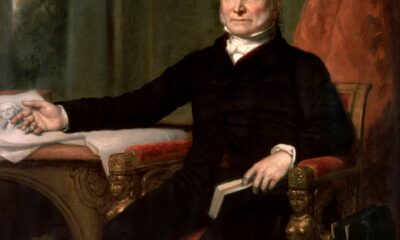Guest Columns
Jesse Owens Broke Barriers and Records in 1936
Jesse Owens broke records at the 1936 Munich Olympics, won four gold medals – and formed a friendship with a German athlete.

Jesse Owens is one of the great American athletic heroes. Not only did he win four gold medals in the 1936 Berlin Olympics – he did it while standing up to the racism of Nazi Germany. Owens’s incredible success destroyed Adolf Hitler’s myth of an “Aryan master race,” and stands as a testament to the American principle of universal equality.
Jesse Owens was the perfect Olympian
The son of sharecroppers and the grandson of enslaved Alabamians, Owens’ work ethic combined with his magnanimity portended an unbelievable athletic career. As a high schooler he won all the major track events, including the state championship three years in a row. Nicknamed the “Buckeye Bullet,” at Ohio State University, Owens broke three world records and tied another in one afternoon. Some have called it “the greatest 45 minutes in sports history.”
He accomplished these feats during a time of rampant segregation: he never received a scholarship, never stayed in the same hotels as his white teammates, and despite serving as varsity captain, Owens was forced to live off campus.
Meanwhile, as the 1936 Berlin Olympics approached, many Americans urged the United States to boycott the games. Initially, Owens sided with the boycott, stating in November 1935, “if there is discrimination against minorities in Germany, then we must withdraw from the Olympics.” Nazi officials, however, assured America that Jewish and Black athletes would receive equal treatment. These assurances proved decisive: the American Amateur Union threw its weight behind the American Olympic Committee, effectively avoiding a US boycott.
Bigotry at the 1936 Games
Owens committed to participating in the Games, and responding to his critics, said “since we are all Americans, Negroes should have a chance in every sport. Certainly the showing of Negroes in track events shows that if they have half a chance, they produce the goods.” Nonetheless, Owens faced immense bigotry at the games – Hitler himself, for example, left his seat rather than watch him participate in the long-jump. And during competition, German referees called bogus fouls against him.
Making his final attempt in the event, Jesse Owens stood in “total” panic near his starting position. He couldn’t stop thinking about Hitler’s snub, the bogus foul, and a smirk from his competitor Luz Long, a blond-haired, blue-eyed embodiment of the so-called “Aryan Ideal.”
Owens almost dropped to the ground in front of 100,000 chanting Germans, who he believed “hatefully, gleefully” wanted him to fail. Knees-shaking, he clenched his jaw to stop his thoughts from racing. And then it happened.
Long, Hitler’s “Aryan Ideal,” touched Owens, a Black man, in full view of the entire stadium. Like a family member, he gently chided Owens: he knew that Hitler had insulted him, he knew the stakes, but he knew that he and Owens were essentially the same.
“I have thought,” Long told him, “You are like I am. You must do it one hundred percent. Correct?” Owens nodded. “Yet you must be sure not to foul.”
As Owens approaches his moment…
The loudspeaker announced Owens to the crowd.
“Then you can do both things, Jesse. You re-measure your steps. You take off six inches behind the foul board. You jump as hard as you can. But you need not fear to foul.”
Sure enough, now with a towel carefully marking six inches before the takeoff board, he ran, jumped, and won the gold. By the end of the Olympics, Owens won four out of the United States’ eleven gold medals.
Long’s advice left an indelible mark on Owens. After he failed to beat Owens, he raced over to him, grabbed his hand, and marched toward the stands chanting “Jesse Owens!” – in full view of Hitler, who had reappeared in the stands to watch Long’s performance.
Long and Owens became fast friends and spent many nights talking politics, philosophy, and sports in the Olympic Village. The German explained that although he did not subscribe to Hitler’s racial fanaticism, he loved his country and would fight for it. After the Olympics, they remained in touch. In 1939, Owens received a final letter from Long detailing his fears for the future and love for his family. Long died fighting in the Wehrmacht after succumbing to wounds he received during the Allied invasion of Italy in 1943.
A human being first, last and always
Reflecting on his experience in the long jump, Owens did not waste ink writing about Hitler: His lasting memory of the Olympics was the relationship he formed with Luz Long. Their friendship came from what Owens described as “the priceless knowledge that the only bond worth anything between human beings is their humanness.”
Owens recognized that if Long, a human being living in Nazi Germany, could walk with him around the Olympic stadium, then all people could strive to recognize each other’s fundamental equality and “be a human being first and last, if not always.”
This article was originally published by RealClearHistory and made available via RealClearWire.
Elliott Drago is the resident historian and manager of the History Initiative at the Jack Miller Center.
-

 Accountability3 days ago
Accountability3 days agoWaste of the Day: Principal Bought Lobster with School Funds
-

 Constitution2 days ago
Constitution2 days agoTrump, Canada, and the Constitutional Problem Beneath the Bridge
-

 Executive1 day ago
Executive1 day agoHow Relaxed COVID-Era Rules Fueled Minnesota’s Biggest Scam
-

 Civilization5 hours ago
Civilization5 hours agoWhy Europe Shouldn’t Be Upset at Trump’s Venezuelan Actions
-

 Civilization1 day ago
Civilization1 day agoThe End of Purple States and Competitive Districts
-

 Christianity Today4 hours ago
Christianity Today4 hours agoSurprising Revival: Gen Z Men & Highly Educated Lead Return to Religion
-

 Civilization5 days ago
Civilization5 days agoThe devil is in the details
-

 Executive4 days ago
Executive4 days agoTwo New Books Bash Covid Failures














